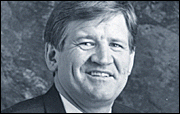

![]()
Other Views


![]()
Other Views
HAVING just returned from the World Trade Organization Ministerial Meeting in Seattle, I am eager to share some of my observations, impressions and thoughts as the smoke is almost literally still clearing. Seattle talks were
not waste of effortThe violence and destruction of property in Seattle must not obscure the fact that there were also many responsible people and organizations articulating legitimate positions.
But perhaps more so than from the protests, the breakdown in Seattle might have been the result of trying to do too much too soon, without adequate preparatory work.
Lack of leadership by the United States, Japan and the European Union also helped to undermine progress in Seattle.
But perhaps the most telling reason for the breakdown was the ongoing failure to state the case -- clearly and unambiguously -- for the benefits of globalization and the WTO's efforts to liberalize trade and investment.
The "end game" of the WTO is simple: to eliminate poverty and to permit all the peoples of the world to raise their standard of living.
Unfortunately, this side of the story was not effectively articulated. Worse yet, a good deal of misinformation about the WTO and globalization seems to have seeped into the debate.
One of the most frustrating pieces of misinformation I heard propagated again and again in Seattle was that "nameless, faceless WTO bureaucrats" would somehow be empowered to dictate laws in the United States.
I must point out that the U.S. Constitution is fairly clear on this matter. Laws are made in the Congress by the elected representatives of the people. Period. Not in Geneva, and certainly not by the WTO.
The assertion that the WTO is somehow undemocratic is equally hard to fathom. The overwhelming majority of the some 130 nations that gathered in Seattle represent democratically elected governments. In these nations, power resides in the hands of the people who select representatives at the ballot box, not in the hands of "nameless, faceless WTO bureaucrats."
The Pacific Basin Economic Council has been a leader in raising, debating, and discussing many of these same issues -- from the environment to social responsibility and anti-corruption.
THE agenda for PBEC's International General Meeting (IGM) -- coming to Hawaii for the first time in March -- reflects many of these important issues and a commitment to assessing all aspects of globalization.
This will be the first major international business meeting in the region in the wake of the Seattle WTO Ministerial. We hope that by bringing the leading minds of business, government, and academia to Hawaii to discuss these issues, we can help establish Hawaii's reputation as a serious destination for international business, and a gathering place at the crossroads of the Pacific to reflect upon the new global realities.
In PBEC, we reward companies that promote sound environmentalism in their business practices. We will present our second annual environmental award to recognize PBEC member companies that demonstrate outstanding commitment to promoting and protecting the environment.
We hope that drawing attention to companies that have developed exemplary environmental practices will encourage others to reach for even higher standards in environmental responsibility. Many PBEC member companies are proving that business and environmentalism go hand in hand.
In a panel on social responsibility, the IGM will feature speakers from some of the most progressive and forward-looking companies in the world. PBEC has been a longtime proponent of the notion that companies must not only be concerned about dollars and cents, but also must contribute to the larger society in which they operate.
In Seattle, it was interesting to note how many visitors from developing nations expressed incredulity that a city that has flourished so much as a result of international trade would become the focal point for anti-trade protests.
If you doubt the benefits of globalization, they seemed to say, open your eyes and look around! Perhaps we could learn a thing or two from our friends in the developing world.
Despite the lack of a final agreement, a tremendous amount of progress was made in Seattle. Now is the time for the WTO to regroup, to learn the lessons from Seattle and to rebuild support for a new round of trade negotiations.
Robert G. Lees is secretary general of the Pacific Basin Economic Council.